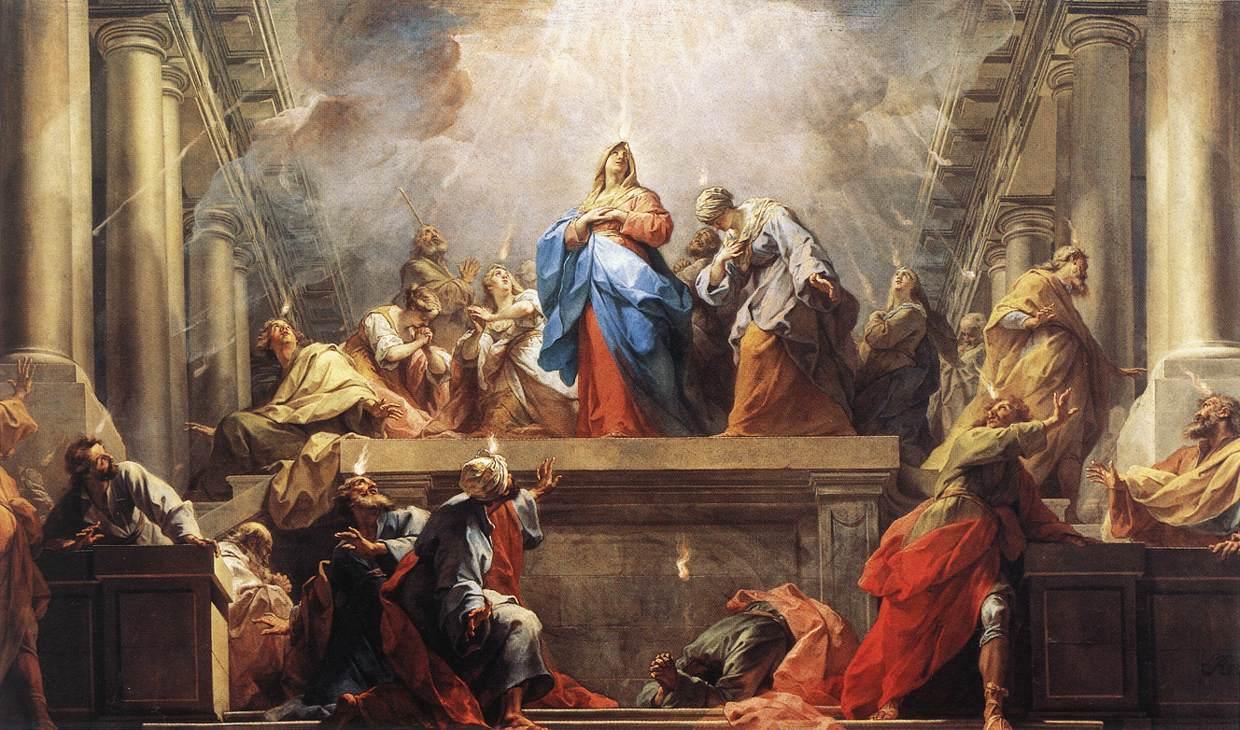Worsip Helps for Pentecost
Artwork: Pentecost
Artist: Jean II Restout
Date: 1732
Format: Oil on canvas
Worship Theme: The fifty days have passed and the promised
Holy Spirit is poured out upon the Bride of Christ. The once-hidden gospel is
no longer the possession of a chosen few. For the Spirit enables the message of
salvation to enflame hearts for bearing witness to the ends of the earth.
Old Testament: Genesis 11:1-9 Now the whole world had one
language and a common speech. 2 As men moved eastward, they found a
plain in Shinar Babel
1. How was the world
after the flood very different from the world today (verse 1)?
2. For what two sinful
reasons did people decide to build a very tall tower (verse 4)?
3. Why did God say,
“Come, let us confuse their language” (verse 7)?
Epistle: Acts
2:1-21 When the day of Pentecost came, they were all together in one place.
2 Suddenly a sound like the blowing of a violent wind came from heaven
and filled the whole house where they were sitting. 3 They saw what
seemed to be tongues of fire that separated and came to rest on each of them.
4 All of them were filled with the Holy Spirit and began to speak in
other tongues as the Spirit enabled them. 5 Now there were staying
in Jerusalem God-fearing Jews from every nation under heaven. 6 When
they heard this sound, a crowd came together in bewilderment, because each one
heard them speaking in his own language. 7 Utterly amazed, they
asked: "Are not all these men who are speaking Galileans? 8
Then how is it that each of us hears them in his own native language? 9
Parthians, Medes and Elamites; residents of Mesopotamia, Judea and Cappadocia,
Pontus and Asia, 10 Phrygia and Pamphylia, Egypt and the parts of
Libya near Cyrene; visitors from Rome 11 (both Jews and converts to
Judaism); Cretans and Arabs-- we hear them declaring the wonders of God in our
own tongues!" 12 Amazed and perplexed, they asked one another,
"What does this mean?" 13 Some, however, made fun of them
and said, "They have had too much wine." 14 Then Peter
stood up with the Eleven, raised his voice and addressed the crowd:
"Fellow Jews and all of you who live in Jerusalem
4. What two dramatic
signs came from heaven and showed the presence and power of the Holy Spirit
(verses 2–3)?
5. How do those signs
display and fit the work of the Spirit?
6. Why did God promise
to pour out his Spirit on all people (verses 17–21)?
Gospel: John 15:26-27 "When the Counselor comes, whom
I will send to you from the Father, the Spirit of truth who goes out from the
Father, he will testify about me. 27 And you also must testify, for
you have been with me from the beginning.”
7. What name does Jesus
first give the Holy Spirit (verse 26)? What does this name mean?
8. What second name
does Jesus give the Holy Spirit (verse 26)? What does this name mean?
Answers:
1. The world after the
flood had only one language.
2. The people decided
to build a tall tower a) to make a name for themselves (in pride) and b) to
keep themselves from being scattered far and wide (in stubborn disobedience of
God’s command).
3. God said “Let us
confuse their language” because he is Three-in-One: Father, Son and Holy
Spirit, yet one God.
4. The two signs were
a) a sound of a rushing wind that came from heaven and filled the whole house
b) tongues of fire that appeared on the heads of each in the house.
5. Like the wind, the
Holy Spirit works invisibly, but powerfully. (In Greek and Hebrew “wind” and
“spirit” are the same word.) Like fire, the Holy Spirit warms and energizes us
with the good news of all Jesus has done in our place.
6. God promised to pour
out his Spirit on all people so that they would call on Jesus’ name and be
saved.
7. Jesus calls the Holy
Spirit, “the Counselor.” That name means he is the one who helps us by talking
to us.
8. Secondly, Jesus
calls the Holy Spirit “the Spirit of truth.” All he speaks is truth. God’s Word
is total truth!
The word or work of any man
does not produce the true presence of Christ’s body and blood in the Supper. This is true whether we consider the merit or
recitation of the minister or the eating, drinking, or faith of the
communicants. Christ’s presence should
be credited only to Almighty God’s power and our Lord Jesus Christ’s word,
institution, and ordination.
Jesus Christ’s words, which He
spoke at the first institution, were effective not only at the first Supper. They are valid, and are still effective. So where the Supper is celebrated according to
Christ’s institution and His words are used, Christ’s body and blood are truly
present, distributed, and received, because of the power and effectiveness of
the words that Christ spoke at the first Supper. Chrysostom says:
Christ Himself prepared this
table and blesses it. For no man makes
the bread and wine set before us into Christ’s body and blood, only Christ
Himself, who was crucified for us. The
declaration “Be fruitful and multiply and fill the earth” was spoken only once.
But it is ever effective in nature, so
that it is fruitful and multiplies. So
also this declaration ‹,This is My body; this is My blood,› was spoken once. But to this day in the Supper of the Church
His true body and blood are present. – Formula of Concord

Comments
Post a Comment